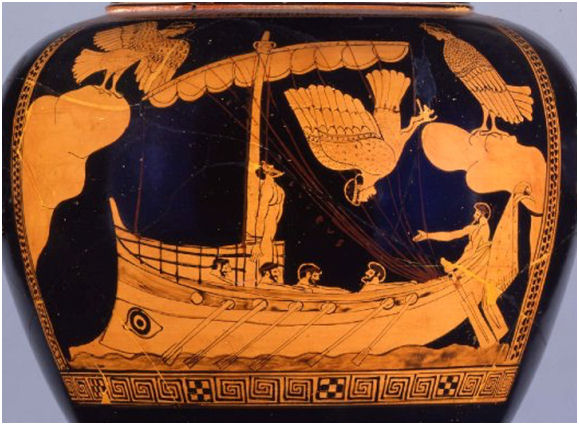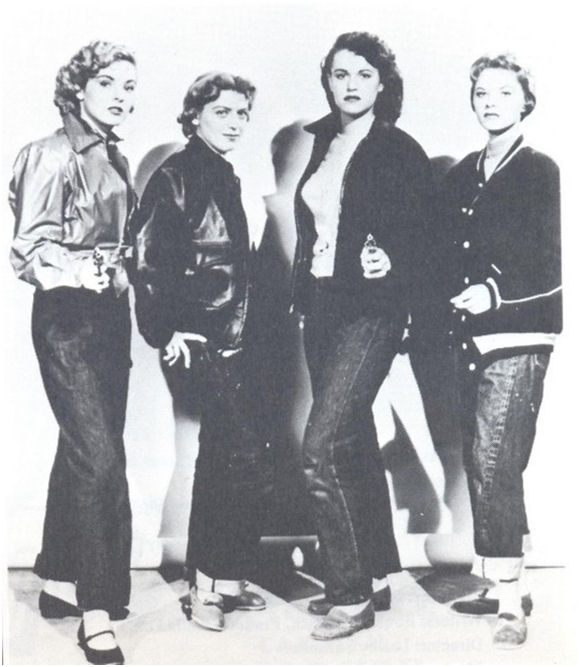Notes on “We Are Sirens”
L.S. Johnson

This is the seed: a class called “Integrated Liberal Studies” in my senior year of high school. We read Homer, we read snatches of Ovid and Virgil, and I felt myself falling down a grotesque rabbit hole: women chased and women abandoned, women thwarted and women kidnapped, women raped and maimed and murdered and no rhyme or reason to any of it, just the will of the gods folks nothing to see here move along.
Decades later, I’m forwarded the call for Sirens stories and at once I’m back in that hot autumn classroom, thinking about sneaking a cigarette on my break, or about going out to a club that weekend with my fake ID and dancing to a band and making out with strange men. My teacher drones on about Odysseus Odysseus and who cares? The whole book is basically about a guy cheating on his wife and getting away with it, while the women of the story—Circe and her swine, the Sirens singing in their field of rotting corpses, Penelope’s weaving tactics—are just “episodes” in the journey of this asshole guy.
But that was then, and this is now, and I’m a writer, damn it.
#
It’s some weeks later and I’m turning, turning the idea of Sirens over in my head, looking for a way in . . . and it’s Saturday night, and we’re watching Mystery Science Theater 3000, like you do. Episode 610, to be exact: The Violent Years. 
There is nothing good about this movie, yet this time around I find it strangely enthralling. These women. These women with their anger and their pistols, their boy-clothes and their bandanna masks. I had forgotten about the rape scene, too—that rare spectacle, a woman raping a man—how she strips off her sweater with that wooden expression. Mike and the ‘bots giggle and crack wise, but this time around I feel angry: that these women are just puppets for Ed Wood’s straw man storyline; that they’re doomed, doomed, because the 1950s needed them to be doomed. Oh, that they could just keep on going, stealing petty cash and partying with bad boys and rolling around in that big old ’54 Cadillac.
They stay in my head, these women, lounging on the hood of their car, smoking and cleaning their weapons, waiting for me to do something about it.
#
I’ve seen a lot of girl gang movies, and there’s always something that feels off to me. Something about how the stories are framed; something about how the women’s choices unfold . . . as if they have no choice at all, as if whoever is plotting their lives needs them to be something very particular. Not a character but a trope, an idea.
Not a character but a myth.
#
 My Sirens are a mashup of different Greek writings: a dollop of Homer, a line of Hyginus, all topped off with a few spoonfuls of Lycophron. Like so many figures in Greek mythology, Sirens are who their authors need them to be: an episode, an explanation, even a cautionary tale, but always without motivation or agency. Thus Hyginus:
My Sirens are a mashup of different Greek writings: a dollop of Homer, a line of Hyginus, all topped off with a few spoonfuls of Lycophron. Like so many figures in Greek mythology, Sirens are who their authors need them to be: an episode, an explanation, even a cautionary tale, but always without motivation or agency. Thus Hyginus:
“It was predicted that [the Sirens] would live only until someone who heard their singing would pass by. Ulysses proved fatal to them, for when by his cleverness he passed by the rocks where they dwelt, they threw themselves into the sea.”
I re-read these lines, and in my head five women look up from where they sprawl on the hood of their Cadillac, roll their eyes, and sing out in unison, “As if.”
Thus do stories begin.
L.S. Johnson was born in New York and now lives in Northern California, where she feeds her four cats by writing book indexes. Her stories have appeared in Strange Horizons, Interzone, Long Hidden, Year’s Best Weird Fiction, and other venues, and she has been nominated for a Pushcart Prize and longlisted for the Tiptree Award. Her first collection, Vacui Magia: Stories, is now available. Find out more about her at http://traversingz.com/.

Get It Now!
Images: 1) Red-figured stamnos showing Odysseus and the Sirens, copyright The Trustees of the British Museum. 2) Publicity still from The Violent Years. 3) The Sirens and Ulysses, William Etty, 1837.

